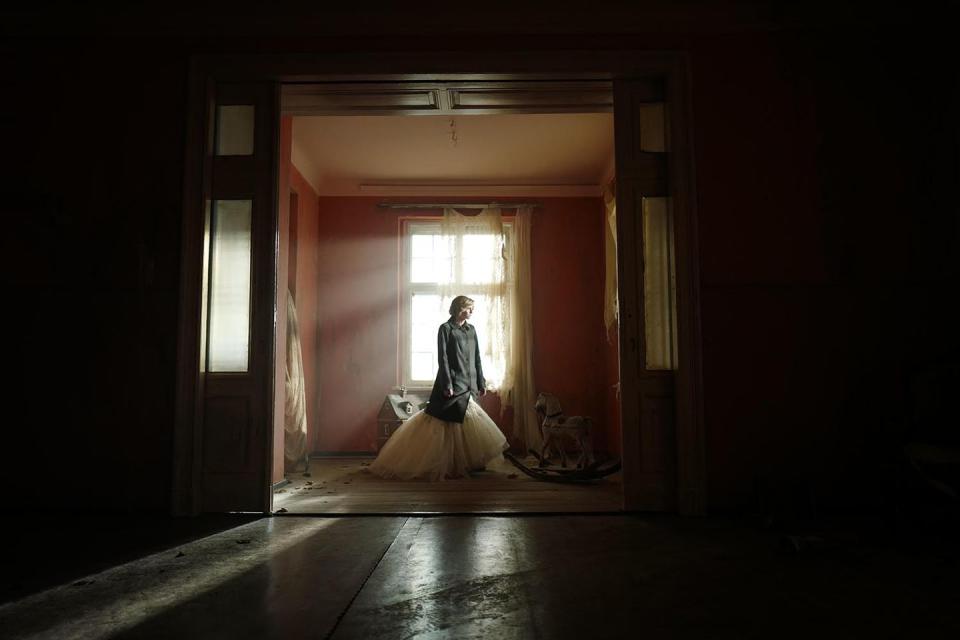Why you should watch… Kristen Stewart rail against the Royal Family as Princess Diana in 'Spencer'
Watch: Kristen Stewart: I was physically affected by fear of playing Diana
The swooping façades of Sandringham Estate emerge from the December fog with an imposing, untouchable grandeur. In this storied residence, nothing is out of place: the frostbitten lawn is perfectly manicured; motorcades pull into the driveway with total uniformity; and chefs march single-file into the kitchen in impeccable synchronicity.
The opening minutes of Spencer – Pablo Larraín’s dreamy, unconventional Princess Diana film – feature enough symmetrical shots to rival a Wes Anderson movie, and yet here the aesthetic smoothness is used to sinister effect. The rigid linearity, of the grounds and the staff, is a visual imploration to stay in your lane, follow royal customs (however ridiculous) and keep any complaints to yourself. The Windsors’ established order is soon disrupted when we cut to Diana (Kristen Stewart), pulled over in some country lane, late, lost and without her security detail. Her first words – a bewildered “Where the fuck am I?” whose expletive gives a thrilling jolt from the mouth of the People’s Princess – set the tone for Spencer. The film is not especially interested in Princess Diana as an icon or historical figure; instead, it casts her as a tragic heroine and submerges us in the sinking morass of her troubled headspace.
Spencer is a compact biopic, taking place over a fictional Christmas weekend in which Diana decides to renounce the Royal Family in the wake of Charles’ humiliating public affair. As a Chilean, Larraín is at a sufficient remove from the nationalistic myth-making around the British monarchy to expose its unshakeable anachronism. The film offers a rather unflattering portrait of the institution, whose members come across as cold and unyielding, tightly gripping onto the past at the expense of their future. They are not creatures of flesh and blood so much as automatons programmed to obey arbitrary social laws – Jack Farthing as Charles is particularly effective in this respect, a stiff upper lip made man. The servants, too, have been indoctrinated with their employers’ manners and mores, speaking to Diana in reproachful soundbytes about duty and honour (“No one is above tradition,” warns Timothy Spall’s gaunt, steely-eyed henchman, who tracks the Princess around the castle with a hunter’s rabid fervour).

However strong its supporting cast, Spencer is first and foremost a showcase role for its star – just as Larraín’s 2016 movie Jackie was for Natalie Portman. Because the film envisages what Diana was like behind closed doors, Stewart is given the latitude to expand the characterisation beyond the Princess' tabloid image. Yes, the actress nails the accent and coltish physicality, but most arresting is the way she holds defiance in her jaw, blazing determination in her eyes. Hers is a Diana who refuses to carve up her identity into discrete public and private personae, treats snitching servants as confidantes and disarms ladies-in-waiting with unseemly ripostes (“Now leave me, I wish to masturbate,” she remarks with crisp, deadpan humour).
Spencer is at its best when it dips into her imagination for feverish fantasy sequences, during which the volume of Jonny Greenwood’s hair-raising jazz score notches up and up until it overwhelms the senses, allowing audiences to vicariously experience the Princess’ loss of control. In one hallucinatory dinner-table scene, Diana feels so suffocated by the pearl necklace Charles has gifted her – a symbol of his infidelity since he gave Camilla exactly the same one – she rips it from her neck and crunches down the golf ball-sized stones from her bowl of soup, smearing the congealing liquid around her mouth in a fit of anxiety.

She is haunted by the past: flashes of the ghost of Anne Boleyn (another royal woman scorned) around the palace are a clear harbinger of death, while bright memories of Diana’s own carefree, hula-hooping childhood intrude with increasing frequency as the film progresses, a sad reminder of innocence lost. The schism between the real and the imagined in Spencer means Stewart must operate on a number of different frequencies. She rises to the occasion, demonstrating her range by flitting dexterously from paranoia to grief, longing to rage in burrowing close-ups.
Britain – nay, the world! – has a vulturous obsession with the life of Princess Diana and hungrily picks over her tragic legacy at any opportunity. Frankly, all media that depicts her taps into this ghoulish impulse, but Spencer seems resolved to separate itself from the pack with its title, which suggests a reclamation of Diana’s selfhood, a return to lost joy. The film is a celebration of a woman who refused to colour within the lines and let her rainbow shine forth, consequences be damned.

‘Spencer’ is released in cinemas on 5 November.
Watch: Spencer trailer
You Might Also Like


